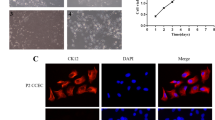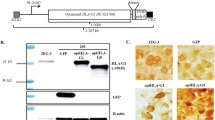Abstract
· Background: To determine the potential of somatic gene transfer as a novel technique for modulating corneal wound healing on a cellular level, the successful transduction of human keratocytes should be ascertained in vitro. In addition, the ability of different polycations to increase the transduction efficiency and their antiproliferative and cytotoxic effects should be assessed. · Methods: To test transduction efficiency (X-Gal staining), cultured human keratocytes were incubated for 2 h with a retroviral vector bearing the β-galactosidase gene, with and without the addition of polybrene or protamine sulfate. To test the antiproliferative and cytotoxic effects, cultured human keratocytes were incubated with various concentrations of polybrene and protamine sulfate (0.08 to 800 μg/ml) for 2, 24 and 72 h, and evaluations were performed by means of an XTT-based colorimetric assay and phase-contrast microscopy. · Results: Human keratocytes in vitro were transduced successfully with the ß-galactosidase gene (3.5±1.0%). Transduction efficiency was significantly (P≤0.01) improved by addition of a polycation (from 12.3±1.7% to 18.6±2.3%), but there was no significant difference between the effects of polybrene and those of protamine sulfate. Both drugs induced a highly significant dose-dependent inhibition of proliferation (P<0.001). ID50 ranged from 11 to 22 μg/ml with polybrene and from 15 to 244 μg/ml with protamine sulfate. Only with doses of 80 and 800 μg/ml did protamine sulfate produce less antiproliferative effects than polybrene (P≤0.04). The lowest concentrations induced no morphological signs of cytotoxicity, whereas these signs were mild at 8 μg/ml and moderate to severe at the highest concentrations. · Conclusions: Both polybrene and protamine sulfate can significantly improve the in vitro efficiency of successful retroviral vector-mediated gene transfer into keratocytes. Mild cytotoxic and moderate antiproliferative effects are to be expected in cultured keratocytes with a standard transduction procedure (8 μg/ml for 2 h).
Similar content being viewed by others
Author information
Authors and Affiliations
Additional information
Received: 15 January 1997 Revised version received: 10 September 1997 Accepted: 5 November 1997
Rights and permissions
About this article
Cite this article
Seitz, B., Baktanian, E., Gordon, E. et al. Retroviral vector-mediated gene transfer into keratocytes: in vitro effects of polybrene and protamine sulfate. Graefe's Arch Clin Exp Ophthalmol 236, 602–612 (1998). https://doi.org/10.1007/s004170050129
Issue Date:
DOI: https://doi.org/10.1007/s004170050129




